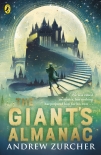The Giant's Almanac by Andrew Zurcher (best summer reads of all time .TXT) 📗

- Author: Andrew Zurcher
Book online «The Giant's Almanac by Andrew Zurcher (best summer reads of all time .TXT) 📗». Author Andrew Zurcher
Seconds later, the train slipped past them on the right side, an eruption and riot of light and sound. Clare pulled Fitz to her and held him, sobbing into his mass of dark hair. Over her shoulder as the train screamed past, Fitz watched the big empty squares of the lighted windows as they flicked by, frame after frame, like the film of an old projector reeling from the machine.
It’s empty. The train is empty.
It wasn’t quite true. He had seen the driver clearly enough: a woman with a brown bob, dressed in a suit of blue, and over that a brilliant red cloak. Her gaze had been fixed on the track dead ahead, with something – strange enough that Fitz doubted his own eyes, doubted the distance, doubted the jumbling speed and the light – something like a smile playing at the corner of her cheek.
‘That’s why I call it a hopper,’ said Mr Ahmadi, to no one.
That was to be the last of their adventures on the gig. For a time, through an uncannily empty gloom they sped, past silent stations with their stifled lights looming overhead, through still villages behind drawn curtains, between deserted, endless yards piled high with shadows. As it drew into the outskirts of London the direction of the line altered, and Mr Ahmadi had to trim the sail. For a while the buggy rolled on, more sedately than before, between hedges and houses and walls and – at last – the intermittent tunnels of the capital’s perimeter, but the sail didn’t begin to give out, at last, until they had reached almost the centre of the city. Here, as the cloth sagged and ruffled, beside an unmarked and unlit service platform at the edge of a desolate waste of tracks that ran away as far as Fitz’s eye could see, Mr Ahmadi pulled the gig up and to a final stop. In a great sweeping of his arms he drew the sailcloth, while it still fluttered windily in the air, through the ring, and folded it as it came.
Working fast, Mr Ahmadi stowed the gig in thick bushes growing at the side of the tracks, then – vaulting easily on to the platform – rejoined the little huddle of his shaken passengers. The wind still licked at his cape, and his thick black hair, raked this way and that by its gusts, revealed in his face a complicated tangle of fatigue, fear, exhilaration, intelligence and brooding. ‘I will come for it when the wind changes,’ he said. ‘For now, we go down.’ He cocked his head to a stairway at the end of the platform, which disappeared into the ground.
The stench from the stairs hit before they reached them; as they descended, it only grew stronger. Rotting, festering leaves had been blown by the wind into small clumps in the corner of every tread. Soaked with rain, or worse, they stained the air with must and the promise of vermin. Broken lights hung from the sloped ceiling, among flaking paint and crumbling concrete. Aslan stumbled, and Fitz caught him by the collar.
‘The lamp,’ said Mr Ahmadi. He had drawn Fitz with him to the front of their orderly file. Fitz looked down at his hand, as if it were a landscape on the other end of a telescope, and was surprised to find that he still had the lamp-strap wound about his left wrist, and that the lamp still sat snug in his palm. As he unbound it from his locked grasp, his fingers ached in the tough, swollen grooves where he had almost entirely cut off his circulation. But the crescent pearl of the lamp, when unwrapped, shone brightly enough to show them where they were going – down another steep flight, and on to a platform that ran along underground tracks. As they neared its end, Mr Ahmadi turned and stopped them.
‘This is a tube service line. The platform will continue on a narrow ledge for another few hundred metres; after that, we’re going to have to walk on the tracks. Keep to the right and do exactly what I do. There won’t be any trains on this part of the line, not tonight. It will take about a quarter of an hour.’ Mr Ahmadi made as if to turn, but saw the question, hot and severe, in Clare’s eyes. ‘He’s safer down here than he is up there,’ said Mr Ahmadi.
At the end of the platform, a little ledge about a foot in breadth continued alongside the track. Single file, Mr Ahmadi still in the lead and Fitz behind him with the lamp, they carried on into the darkness. After a while the ledge sloped down to track level, and the ground became rougher, dirtier, at times studded with huge bolts and concrete slabs that seemed designed for no other purpose than to knock, bruise and scrape them as they passed. Once or twice Fitz thought he noticed in the corner of his eye a flash or sudden darting movement, as of eyes or the quick flick of a tail, but he kept his feet moving forward, right in Mr Ahmadi’s footsteps, one tread after another; not even Aslan, usually ready to chase anything that twitched, was distracted. For ten or twelve minutes, for longer, they trudged beside the tracks, once or twice merging with, then dividing from, other lines. The metal rails seemed to slope ever downward, towards a rumbling sound that came intermittently and afar off from beneath their feet.
Fitz





Comments (0)